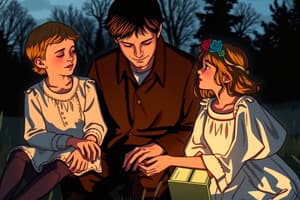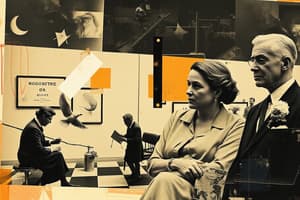Podcast
Questions and Answers
How does Calvin feel about his family?
How does Calvin feel about his family?
He doesn't feel like he matters. His mother doesn't take good care of herself or her children. He doesn't feel that he fits in with them.
Why is Meg good at math?
Why is Meg good at math?
Her father taught her some shortcuts.
Why does Mrs. Murry think Meg does so poorly in school?
Why does Mrs. Murry think Meg does so poorly in school?
The teachers want her to do things their way. Meg refuses to do things the way the teachers want her to.
What did Calvin read Charles Wallace at bedtime?
What did Calvin read Charles Wallace at bedtime?
What is a 'different essence' according to Mrs. Murry, and who might be an example of this?
What is a 'different essence' according to Mrs. Murry, and who might be an example of this?
During their walk, what does Meg tell Calvin about her father?
During their walk, what does Meg tell Calvin about her father?
How are Calvin and Meg's father alike in Meg's eyes?
How are Calvin and Meg's father alike in Meg's eyes?
Who interrupts their walk, and why?
Who interrupts their walk, and why?
Explain the differences between Mrs. Whatsit, Mrs. Who, and Mrs. Which.
Explain the differences between Mrs. Whatsit, Mrs. Who, and Mrs. Which.
What is the purpose of the journey the children take with the Mrs. W's?
What is the purpose of the journey the children take with the Mrs. W's?
What is the conflict of this novel?
What is the conflict of this novel?
What is the tone of this novel?
What is the tone of this novel?
Flashcards are hidden until you start studying
Study Notes
Family and Personal Feelings
- Calvin feels insignificant in his family dynamics, believing he does not matter.
- His mother neglects her own and her children's well-being, contributing to Calvin's feeling of not fitting in.
Academic Abilities
- Meg excels in math due to shortcuts taught by her father, showcasing her intelligence.
Educational Struggles
- Meg's poor performance in school is attributed to her refusal to conform to teachers' methods, leading to friction with educators.
Literature and Influence
- Calvin reads "The Book of Genesis" to Charles Wallace at bedtime, indicating a transfer of knowledge and values.
Individuality
- A "different essence," as described by Mrs. Murry, refers to unique spirits or thought processes. Charles Wallace exemplifies this individuality.
Speculation on Family
- Meg shares her belief with Calvin that her father is involved in a secret government mission, highlighting her worries and curiosity.
Parallels in Characters
- Meg finds similarities between Calvin and her father, noting both exhibit intelligence and compassion for others.
Sudden Interruptions
- Charles Wallace interrupts Meg and Calvin's walk, emphasizing his role in guiding their actions and decisions.
Character Distinctions
- Mrs. Whatsit is the first to visit and connects with Charles; Mrs. Who has communication difficulties, often quoting others; Mrs. Which is ethereal and speaks in elongated phrases.
Purpose of the Journey
- The children's journey with the Mrs. Ws is aimed at locating Mr. Murry and bringing him back home, underlining a theme of family reunion.
Central Conflict
- The novel's conflict centers on Meg's determination to combat the Black Thing and mend her fractured family.
Narrative Tone
- The tone throughout the novel remains suspenseful, enhancing the reader's engagement with the unfolding story.
Studying That Suits You
Use AI to generate personalized quizzes and flashcards to suit your learning preferences.




